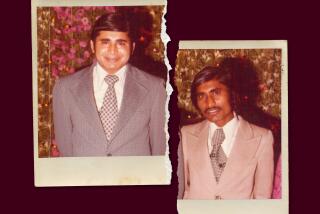Iran Alleged Destination : Guilty Plea Weighed in Illegal Export Case
- Share via
After less than an hour of testimony in his trial on charges he conspired to illegally ship $4 million in military radios and spare parts to Iran, an Encino man asked for a recess Wednesday to consider pleading guilty, his lawyer said.
Khosrow Shakib, 43, was granted a stay in his trial until this morning and planned to discuss with his family the possibility of pleading guilty to the conspiracy charge against him, said attorney Sherwin C. Edelberg.
In return for the guilty plea, the government would not prosecute Shakib on the additional charges it could eventually lodge in the case, said Assistant U.S. Atty. Jeffrey Modisett, who is prosecuting.
“Theoretically, we could charge him for each individual shipment, and in this case that would have been 12 shipments,” Modisett said.
2,000 Portable Radios
Shakib’s request came after the prosecutor’s opening arguments and testimony from the first witness in Shakib’s trial in U.S. District Court in Los Angeles.
In his opening statement, Modisett told the jury that Shakib and several others plotted to smuggle 2,000 portable radios, usually manufactured for the U.S. Army, into Iran in 1983 and 1984 by mislabeling the parts as telephone equipment and sending them through Canada to West Germany.
Shakib and an alleged co-conspirator, Hormoz Hezar, 51, of Beverly Hills, were indicted last November, Modisett said. The men, both Iranian citizens and legal U.S. residents, failed to obtain permission from the State Department to export the equipment, which is a violation of the Arms Control Export Act, Modisett said. Shakib was charged only with conspiring to ship the parts. Hezar was charged with both conspiracy to violate the act and illegal exporting.
The State Department would not have allowed the shipments even if the men had sought permission because the U.S. has banned shipment of military parts to Iran, Modisett said.
Hezar pleaded guilty earlier this month to charges of conspiracy and illegal exporting and will be sentenced in November, Modisett said. Hezar may testify in Shakib’s trial, Modisett said.
Edelberg chose not to make an opening statement. But, in a pretrial hearing, U.S. District Judge Alicemarie H. Stotler ruled that Edelberg could introduce evidence that Shakib, who was an architect for the Shah of Iran, was persecuted following the fall of the Shah’s government and fled in fear of his life to the United States.
Edelberg told Stotler that Shakib was branded as “Zionist” and a loyalist to the deposed Shah. Revolutionary forces of the Ayatollah Khomeini put Shakib against a wall and fired machine guns at him, Edelberg said.
Shakib was uninjured by the firing squad, Edelberg said outside the courtroom.
“To suggest that under these circumstances he would have the motive to somehow benefit the Khomeini government is a non sequitur,” Edelberg told the judge.
Modisett said in court that Shakib might have had other motives for conspiring to export the radios, such as greed or the possibility of favor from the Iranian government on his return to Iran.
2 Guilty Pleas
Outside the courtroom, Edelberg said he would reserve his opening statement to the jury until after the government presents its case. He declined to comment further on his planned defense.
Shakib and Hezar allegedly contracted for the equipment in 1983 from a Los Angeles firm, Aero Electronics, Modisett said. The owner of the firm, Steven Sanett, 33, of Hidden Hills, and two employees pleaded guilty last year to related charges, he said.
Sanett, the first witness in Shakib’s trial, testified Wednesday that he, Shakib and others met several times in 1983 to discuss the sale. Sanett told the jury he knew while negotiating the deal that it was illegal to export the parts without a license.
About 50 complete radios and about a half million dollars in parts actually arrived in Iran, Modisett said.
Modisett said U.S. Customs Service agents investigated the case in cooperation with the Canadian police. The agents were able to trace the 13th shipment to Montreal, he said.
The conspiracy charge carries a maximum sentence of five years in federal prison and/or a $250,000 fine, Modisett said. Shakib is free on $100,000 bond, he said.
More to Read
Sign up for Essential California
The most important California stories and recommendations in your inbox every morning.
You may occasionally receive promotional content from the Los Angeles Times.












